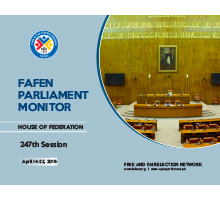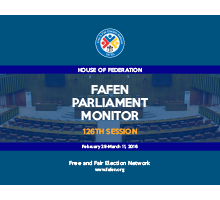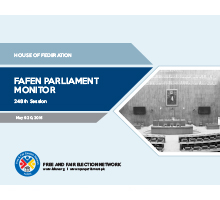The Senate passed six bills and adopted three resolutions during the 247th session held between April 14 and 22, 2016.The House adopted a resolution to count all those sessions which were discontinued after every constitutional suspension of the House since 1973.The reporting session, therefore, has been renumbered as 247th instead of 127th.
With an average of 19% Senators present at the start and 23% at the end of each sitting, the session comprising seven sittings took up most of its agenda. A maximum of 69 (68%) members, on average, attended the session along with the presence of three minority Senators.
On average, each sitting started six minutes behind the scheduled time and lasted three hours and 47 minutes.The Prime Minister did not attend any of the sittings. An effective system of governance is the one where elected Head of Government gets engaged in parliamentary interventions on a regular basis. Sub-rule (2A) of Rule 61 of the Rules of Procedure and Conduct of Business in the Senate also states that the Chief Executive shall attend the Prime Minister’s Zero Hour (last hour of sitting) at least once a week when the Senate is in session.
On the other hand, the Chairman attended five sittings[1] and presided over 76% of the session’s time. The Deputy Chairman attended three sittings and chaired 16% of the proceedings, while two percent of the time was presided over by members of the Panel of Presiding Officers and 6% time was consumed in breaks.
The Leader of the House was present in six sittings and attended 96% of the session’s time, while the Opposition Leader remained present in five sittings and attended 35% of the session’s time.
The parliamentary leaders of PPPP, PkMAP and BNP-M attended seven sittings each while those of PML, PML-F and JUI-F attended (6 sittings each), PTI (5), JI, ANP, PML-N (4 each), MQM, NP and BNP-A (3 each).
The House passed five government bills, including the Pakistan Bait-ul-Mal (Amendment) Bill, 2016; the Offences in Respect of Banks (Special Courts) (Amendment) Bill, 2016; the Equity Participation Fund (Repeal) Bill, 2016; the Banks (Nationalization) (Amendment) Bill, 2016 and the NUST (Amendment) Bill, 2016. The only Private Member’s bill passed by the House was the NUMS (Amendment) Bill, 2015 which was originated in the National Assembly.
The PBM (Amendment) Bill, 2016 suggested changes in the composition of the PBM board. After 18th Amendment, PBM Board became defunct due to the devolution of various subjects to the provinces; therefore, it had become imperative to amend the Pakistan Bait ul Mal Act, 1991 by shifting its administrative control from the Ministry of Women Development, Social Welfare and Special Education to a Ministry or Division under Rules of Business 1973.
While, the Offences in Respect of Banks (Special Courts) (Amendment) Bill, 2016 is aimed at providing right of appeal to an aggrieved person against order of acquittal of an accused person, whereas the Equity Participation Fund (Repeal) Bill, 2016 provides for repealing the Equity Participation Fund.
The Banks (Nationalization) (Amendment) Bill, 2016 is aimed at empowering the federal government to avail the services of competent bankers in public interest and to safeguard its direct and indirect shareholding. It will also facilitate the private shareholders to elect their representatives on the Board of the Directors of such banks having private as well as public sector’s shareholding.
The NUST (Amendment) Bill, 2016 will provide legal cover to appoint a best suited education manager as Rector, NUST by removing the condition for having `engineering’ qualification for the said post.
The NUMS (Amendment) Bill, 2015 is aimed at asserting the role of PMDC in oversight and guidance to the National University of Medical Sciences.
Two bills – the PMDC (Amendment) Bill, 2016 and the National Accountability (Amendment) Bill, 2015 – were deferred. The House also disallowed introduction of the Constitutional Bill seeking amendments to Articles 5 and 6.
Seven bills were introduced in the House which were referred to the relevant standing committees for further deliberations. The first bill, The Members, Election Commission (Salary, Allowances, perks and Privileges) Bill, 2016 is about entitlement of salary, allowances, perks and privileges of ECP members as admissible to the judge of a High Court.
The second bill, the National Energy Efficiency and Conservation Bill, 2016 is aimed at providing for the establishment of institutions and enunciation of mechanisms and procedures so as to provide for effective conservation and efficient use of energy.
The third bill, the Corporate Restructuring Companies Bill, 2016 is about establishment, licensing and regulation of corporate restructuring companies and the manner in which they can carry on business. It seeks to declare the corporate restructuring as new form of business under which companies can be formed in Pakistan for the purpose of transforming the financially distressed companies to financially and operationally viable companies.
The fourth bill, the ICT Local Government (Amendment) Bill, 2016 is aimed at devolving political power and decentralizing administrative and financial authority to accountable local government in ICT for effective delivery of public services at grassroots level by properly recognizing the needs of urban and rural belts of the Capital.
The fifth bill, the Financial Institutions (Recovery of Finances) (Amendment) Bill, 2016 is about creation of security interests over movable property and to establish a secured transactions registry.
Meanwhile, the Deposit Protection Corporation Bill, 2016 provides for establishment of Deposit Protection Corporation, as a subsidiary of the State Bank of Pakistan and for the management and control thereof.
Whereas the seventh and last bill, the Financial Institutions (Secured Transactions) Bill, 2016 is aimed at facilitating recovery process of bank loans so that loan defaults and incidence of written off loans could be minimized.
The House took up nine CANs regarding discontinuation of PM Scholarship program, involvement of National Police Foundation in China-cutting, Pakistani businessmen stranded at Moscow airport, non-convening of NFC meeting, non-payment of salaries in Pakistan Steel Mills, non-initiating process of appointing new members in ECP, heavy rainfall in GB and Khyber Pakhtunkhwa, depletion of water resources and tax evasion in business due to non-custom paid vehicles.
A CAN on non-completion of Khanpur Road was dropped due to the mover’s absence while two CANs relating to PIMS rape incident and shifting of COMSTECH Headquarters from Pakistan to some other country were deferred.
The House adopted three resolutions regarding 10-year extension in PM Education Scheme for Students of Balochistan and FATA, renumbering of Senate sessions from August 6, 1973 onwards and empowering ICT elected members to choose their representatives for Senate seats.
One of the resolutions to appoint an administrator at PIMS was disposed of after the assurance of the government, while the second one relating to conversion of tube wells in Balochistan on solar system was deferred and the third resolution regarding discontinuation of free of cost electricity to WAPDA employees was rejected.
The Senate debated six out of eight motions under Rule 218 for 498 minutes that dealt with the hardships being faced by FC personnel, closure of BOL media group, performance of NAB, demolition of kiosks in Islamabad, departure of Pervez Musharraf and revelations made in the Panama Leaks.
A motion on Prime Minister’s Youth Business Loan Scheme was dropped while the one regarding inclusion of security related subjects in educational institutions curriculum was deferred.
Minister for Defence gave an in-camera briefing to the House on an Adjournment Motion(AM) regarding arrest of a high profile spy of Research and Analysis Wing (RAW) operating in Pakistan, especially in Balochistan[2]. The AM on suicide blast at Gulshan-e-Iqbal Park, Lahore was discussed while the Chair admitted another AM on the performance of Pakistan Cricket team in T-20 World Cup for discussion. Of five other AMs, three on the agenda were not taken up, while one was termed out of order and the last one was disposed of by the Chair.
The House witnessed presentation of 17 reports of the standing committees while extension in time period was granted for submission of five reports under Rule 194 (1). Two reports of federal departments were also laid before the House.
The House adopted amendments to Rules 2, 89 and 165 and addition of new rule 264A in the Rules of Procedure and Conduct of Business in the Senate, 2012. In rule 2, sub-rule (1), after the definition of “sitting”, the following definition of “Standing Orders” shall be inserted, namely:- “Standing Orders” means the written Orders of the Chairman notified by the Senate Secretariat.” Amendment in Rule 89 was about justifying automatic vote recording. Amendment in Rule 165 was about reducing the members of the Standing Committees from 12 to 10 while addition of new rule 264A elaborated the application of standing orders.
A total of 109 out of 148 (74%) Starred Questions were taken up on the floor of the House, while Senators raised another 157 Supplementary Questions. Of these, 17 were related to the Ministry of Water and Power followed by Interior and Narcotics Control (12), CADD (11), Finance (10) and Commerce (8).
The lawmakers raised 29 Points of Public Importance that consumed 49 minutes of the session’s time. The House witnessed three walkouts consuming 56 minutes. The opposition, JUI-F and Independent lawmakers conducted walkouts against the unsatisfactory reply of the government to various questions and some other issues, including Chair’s refusal to allow presentation of HEC privatization report and not awarding benefits to FATA teachers at par with the teachers working in other parts of Khyber Pakhtunkhwa.
The Chair gave rulings on Standing Committee on Finance’s report on HEC and the presence of concerned ministers in the House in relation to their ministries/divisions.
FAFEN observes senators’ participation against three categories; members who only submit agenda on the Orders of the Day, those who only debate it and members who both submit agenda and take part in the on-floor discussion. The representatives of almost all parties in Senate participated in the proceeding of the House as 71 (68%) members of the current membership of 104- participated in the session. Thirty-three (32%) lawmakers were such who did not participate in either way.
Senators generally participated in proportion to their party strengths in the House. More members of PPPP (21 of 27) participated in the session followed PML-N (17 of 26), Independent (3 of 10), MQM (4 of 8), PTI (6 of 7), ANP (5 of 6), JUI-F (4 of 5), PML ( 3 of 4), PkMAP ( 2 of 3) and NP (3 of 3). The sole lawmaker of PML-F, JI and BNP-M also participated in the proceeding while none of two BNP-A lawmakers participated in the session.
Sixty-eight percent (58 of 85) male Senators and sixty-eight per cent (13 of 19) female Senators participated in the session, contributing more to the debates as well as submitting agenda items.
Equal representation is awarded to each province in the Upper House and there are currently 23 Senator each (including one non-Muslim) from Punjab, Balochistan, Sindh and Khyber Pakhtunkhwa whereas eight Senators are from FATA and four from ICT. Nineteen lawmakers of Khyber Pakhtunkhwa participated in the session followed by 17 each from Punjab and Sindh and 13 of Balochistan Assembly. Three of four lawmakers of ICT and two out of eight Senators from FATA participated in the session. Two out of four minority members also participated in the House proceeding by taking part in debates.
To download complete report, click here
[1]Mian Raza Rabbani served as Acting President in first two sittings of 247th session
[2] The Chair invoked the provisions of Rule 264 of the Rules of Procedure and Conduct of Business in the Senate, 2012 which is about residuary powers to him for regulating matters. He also invoked Rule 251 by asking the honourable Leader of the House to make a motion that when matter about arrest of Indian spy is set for discussion as the last Item on the agenda of the day, the discussion be carried out in-camera.




